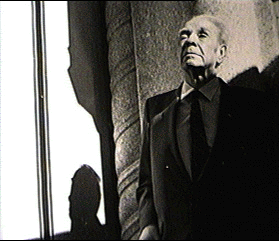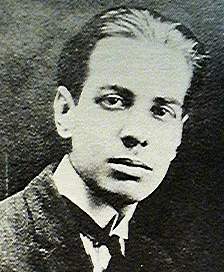 One of the more notable collections in the Special Collections Department at the University of Virginia Library is that of works by and about the Argentine author Jorge Luis Borges (1899-1986), a distinguished poet and essayist and one of the finest writers of short stories in world letters. It contains more than two thousand individual
One of the more notable collections in the Special Collections Department at the University of Virginia Library is that of works by and about the Argentine author Jorge Luis Borges (1899-1986), a distinguished poet and essayist and one of the finest writers of short stories in world letters. It contains more than two thousand individual
items in virtually all formats, spanning Borges’ career of sixty-five years. The collection’s depth is unsurpassed, and many items it contains are quite rare.
During his lifetime, Borges became renowned as a creative artist whose works affected modern literature far beyond the borders of his native land. Despite the critical acclaim Borges enjoyed, however, his books have been uncommonly difficult to acquire, particularly titles from his first decade of active literary production. Some early works survive in only a scant handful of extant copies, the author having recovered and deliberately destroyed many more. The University of Virginia Library owns copies of all these early pieces.
The collection was begun in 1977 with the purchase of some 400 titles originally assembled by a longtime friend of the author, and it has grown through continued acquisitions on a title-by-title basis. There are copies of every known first edition, including those from the 1920s which survive in no more than four or five copies. There are later editions and printings of all Borges’ writings, augmented by translations into a variety of languages. Secondary works represented in the collection include a comprehensive collection of literary criticism in many languages, as well as numerous anthologies containing his works. There are copies of his collaborative writings, prologues to other authors’ books, and his translations of Faulkner and Whitman. There are interviews with the author, and some books from his family library. Original manuscripts in the collection include unpublished items, manuscripts of several major published literary pieces, and a number of letters. Thus, scholars can study early works in their first printed form, some from the manuscript stages, through later variants, printings, editions, or translations. Since Borges deliberately and regularly altered his work by extensive revision, researchers can trace the literary journey traveled by the author.
One of the recently-acquired items in the Borges Collection is a nine-page manuscript acquired in 1996, “Viejo hábito argentino,” which was published as “Nuestro pobre individualismo” in Otras Inquisiciones. The manuscript includes drawings by Borges.
About Borges
Borges was born into a genteel upper-middle-class family in Buenos Aires. Two early influences were his grandmother, who was English (Borges learned to read English before Spanish), and his father’s library. Although Borges spent several years in Geneva before 1918, followed by a period in Spain where he first encountered a literary vanguard known as Ultraism, it was not until his return to Argentina in 1921 that his career really began. He used the pages of several “little magazines” to  promulgate the tenets of Ultraism which comprised the initial foundation for his writing. His first book, Fervor de Buenos Aires, appeared in 1923. He continued to write prolifically, producing more poetry, essays examining a wide variety of topics, and the incomparable short stories for which he became especially well known. Commencing with themes of local interest, Borges turned rapidly to matters of universal culture, utilizing paradox, ambiguity, and skepticism to illustrate his lines of thought. Toward the end of his life he returned, if somewhat less obviously, to subjects more specifically Argentinean. Along the way, he managed to create what was to become one of the great contributions to Latin American literary tradition, “magic realism.” During his life Borges fought unsuccessfully against blindness, which came to him in middle age, just at the time he was named Director of the National Library of Argentina. Eventually he returned to Geneva shortly before his death in 1986.
promulgate the tenets of Ultraism which comprised the initial foundation for his writing. His first book, Fervor de Buenos Aires, appeared in 1923. He continued to write prolifically, producing more poetry, essays examining a wide variety of topics, and the incomparable short stories for which he became especially well known. Commencing with themes of local interest, Borges turned rapidly to matters of universal culture, utilizing paradox, ambiguity, and skepticism to illustrate his lines of thought. Toward the end of his life he returned, if somewhat less obviously, to subjects more specifically Argentinean. Along the way, he managed to create what was to become one of the great contributions to Latin American literary tradition, “magic realism.” During his life Borges fought unsuccessfully against blindness, which came to him in middle age, just at the time he was named Director of the National Library of Argentina. Eventually he returned to Geneva shortly before his death in 1986.
This description of the Borges collection was adapted from an article prepared by C. Jared Loewenstein, Curator of the Borges Collection, for the Library’s publication, Chapter & Verse 10 in 1991. For an in-depth description of the Borges collection see C. Jared Loewenstein’s, A Descriptive Catalogue of the Jorge Luis Borges Collection at the University of Virginia Library, Charlottesville : University Press of Virginia, 1993.
